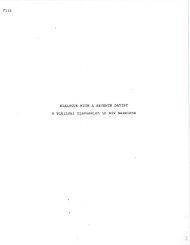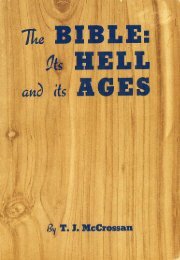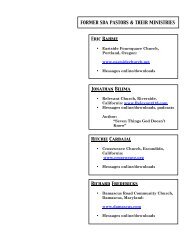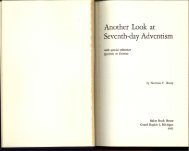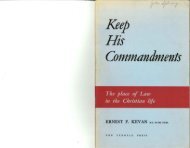Discovering the New Covenant by Greg Taylor - exAdventist Outreach
Discovering the New Covenant by Greg Taylor - exAdventist Outreach
Discovering the New Covenant by Greg Taylor - exAdventist Outreach
You also want an ePaper? Increase the reach of your titles
YUMPU automatically turns print PDFs into web optimized ePapers that Google loves.
DISCOVERING THE NEW COVENANT<br />
disciples, five were on <strong>the</strong> first day, and in <strong>the</strong> o<strong>the</strong>r appearances,<br />
<strong>the</strong>re is no specific mention of which day <strong>the</strong>y took<br />
place. Also that year, <strong>the</strong> feast of Pentecost was on <strong>the</strong> first<br />
day of <strong>the</strong> week. The Christian Church was born on a<br />
Sunday. 4 But this did not mean <strong>the</strong>y attached sacredness or<br />
Sabbath qualities to that day. There were no appeals to <strong>the</strong><br />
Ten Commandments attached to Sunday. Even much later<br />
when Constantine made <strong>the</strong> first Sunday Law, it was just a<br />
law to forbid work on that day, and it was a law that would<br />
benefit everyone. Pagans did not take Sunday off before that<br />
time. It was not a blending of Paganism and Christianity at<br />
all. It was a Christian day that Constantine used to benefit his<br />
empire. It was welcomed <strong>by</strong> Christians and Pagans alike as a<br />
break from work. It made worship more convenient, but it<br />
was not a law based on Sabbath law at all. In fact, <strong>the</strong><br />
farmers were exempt. They could continue <strong>the</strong>ir work. This,<br />
of course, was strictly forbidden in <strong>the</strong> Old <strong>Covenant</strong><br />
Sabbath laws, especially in <strong>the</strong> Ten Commandments. There<br />
was no changing of Sabbath to Sunday <strong>by</strong> Constantine as I<br />
had been taught.<br />
There was some anti-Jewish sentiment at that time.<br />
Some have suggested that since <strong>the</strong> Jews were in trouble<br />
with <strong>the</strong> government, <strong>the</strong> Christians tried to distance <strong>the</strong>mselves<br />
from <strong>the</strong> Jews <strong>by</strong> getting away from Sabbath so as to<br />
avoid persecution. But <strong>the</strong> records from that era do not<br />
indicate a people who did anything because <strong>the</strong>y were trying<br />
to avoid persecution for <strong>the</strong> cause of Christ. The examples<br />
are myriad of Christians standing boldly for <strong>the</strong>ir faith in<br />
spite of <strong>the</strong> threat of death. If this had been a conviction for<br />
<strong>the</strong>m, <strong>the</strong>y would have stood for it. But <strong>the</strong>y were not<br />
convicted about <strong>the</strong> Sabbath, as is clearly evident in <strong>the</strong>ir<br />
literature.<br />
It was not until Augustine in <strong>the</strong> fifth century that any<br />
connection was made between <strong>the</strong> Ten Commandments and<br />
4 Ibid, pp. 142-143.<br />
134



